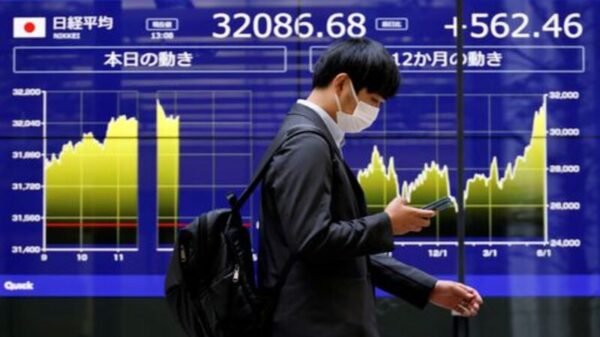Asian equities started tentatively on Monday as investors prepared for central bank meetings from Europe, Japan, and the U.S. this week and U.S. inflation statistics that may impact the Federal Reserve’s monetary policy.
MSCI’s broadest index of Asia-Pacific shares outside Japan (.MIAPJ0000PUS) fell 0.17% to 519.96 after hitting a more than one-month high of 521.94 earlier. Monthly index growth is 4%. Japan’s Nikkei (.N225) climbed 0.7%, while S&P 500 E-mini futures rose 0.15%.
China stocks (.SSEC) fell 0.01%, while Hong Kong’s Hang Seng Index (.HSI) rose 0.3%. China’s stuttering post-COVID-19 economic recovery has impacted markets, with investors hoping for additional policy stimulus as sluggish manufacturing and exports hamper the forecast this year.
Last week, the Reserve Bank of Australia and Bank of Canada shocked markets by raising interest rates to fight stubborn inflation, raising concerns that the Fed would do the same in June.
Citi strategists suggested the Fed may learn from the Bank of Canada that more tightening is needed to reach 2% inflation.
CME FedWatch predicts a 71% chance the U.S. central bank will hold steady on June 13-14.
“It’s a close call between a 25 basis point hike or a’skip’… and will come down to CPI on Tuesday,” Citi said in a note.
Citi forecasts a 25-basis-point Fed rise. When rates should be higher, raise them.
Investors are more confident that the European Central Bank meets on Thursday and will hike rates and remain more hawkish than the Fed.
“We expect (ECB President) Lagarde to retain a hawkish stance on inflation arguing that more needs to be done on the inflation front,” said Jefferies Europe economist Mohit Kumar.
Kumar anticipates the ECB to raise interest rates by 25 basis points. “It is unlikely that Lagarde will give any hint that they are ready to pause after July, which is what the market is currently pricing,” he added.
The dollar index, which compares the dollar to six major currencies, increased 0.048%, while the euro fell 0.04% to $1.0743. The sterling rose 0.05% to $1.2575.
Before Friday’s BOJ policy meeting, the yen fell 0.01% to 139.39 per dollar.
Reuters sources believe the BOJ to retain ultra-loose monetary policy and its estimate for a mild economic recovery this week as strong business and household spending offset declining foreign demand. The Turkish currency hit 23.77 per dollar, another record low.
U.S. crude fell 0.34% to $69.93 a barrel, while Brent fell 0.4% to $74.49. As poor China economic statistics fueled concerns about demand growth in the world’s largest crude importer, both benchmarks fell for a second week.
Gold fell 0.1% to $1,958.69 an ounce. U.S. gold futures declined 0.15%.






































Comment Template